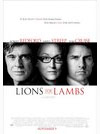 Director Robert Redford shortcuts three plots in the anti-Iraq War film Lions for Lambs. The first plot is an interview by dovish reporter Janine Roth (played by Meryl Streep) of hawkish Senator Jasper Irving (played by Tom Cruise), who has summoned Roth to announce a new strategy to win in Afghanistan. But Senators do not announce new strategies; presidents or Defense Secretaries do, so the film’s premise is pusillanimous, since exposing hubris in the Bush administration is the clear aim. During the interview, Roth questions every premise of the Senator, whose rhetoric is the same tired “we can win.” The point that could have been made is that an ideological struggle with Al Qaeda cannot be won nonideologically, that is, by military action that simply serves as a recruiting ground for Al Qaeda, but alas scriptwriter Matthew Michael Carnahan has chosen argumentation rather than eloquence. The second plot involves soldiers who have been assigned the absurd “new strategy,” namely, taking control of mountaintops during the cold winter in order to dominate the terrain below, but military “intelligence” fails to note that the firepower from below will shoot down helicopters before they can land. The third plot is an odd and unsuccessful colloquy between Political Science Professor Stephen Malley (played by Redford) with Todd Hayes (played by Andrew Garfield), a student who became bored with his course at a “Southern California university” (a Claremont college) and is called into his office so that he can galvanize the brilliant student into engaging in political action. The tagline “If you don't stand for something, you might fall for anything” is rather pathetic. The three plots are connected because two students of the same professor, Arian Finch (played by Derek Luke) and Ernest Rodríguez (played by Michael Peña), have taken up the challenge by volunteering to serve in Afghanistan, end up on one of the mountaintops, and suffer the consequences. In short, Lions for Lambs, rather than promoting political action, inadvertently makes a case for noninvolvement in the very Iraq protest that screams through the subtext of the film, which offers nothing new or profound. MH
Director Robert Redford shortcuts three plots in the anti-Iraq War film Lions for Lambs. The first plot is an interview by dovish reporter Janine Roth (played by Meryl Streep) of hawkish Senator Jasper Irving (played by Tom Cruise), who has summoned Roth to announce a new strategy to win in Afghanistan. But Senators do not announce new strategies; presidents or Defense Secretaries do, so the film’s premise is pusillanimous, since exposing hubris in the Bush administration is the clear aim. During the interview, Roth questions every premise of the Senator, whose rhetoric is the same tired “we can win.” The point that could have been made is that an ideological struggle with Al Qaeda cannot be won nonideologically, that is, by military action that simply serves as a recruiting ground for Al Qaeda, but alas scriptwriter Matthew Michael Carnahan has chosen argumentation rather than eloquence. The second plot involves soldiers who have been assigned the absurd “new strategy,” namely, taking control of mountaintops during the cold winter in order to dominate the terrain below, but military “intelligence” fails to note that the firepower from below will shoot down helicopters before they can land. The third plot is an odd and unsuccessful colloquy between Political Science Professor Stephen Malley (played by Redford) with Todd Hayes (played by Andrew Garfield), a student who became bored with his course at a “Southern California university” (a Claremont college) and is called into his office so that he can galvanize the brilliant student into engaging in political action. The tagline “If you don't stand for something, you might fall for anything” is rather pathetic. The three plots are connected because two students of the same professor, Arian Finch (played by Derek Luke) and Ernest Rodríguez (played by Michael Peña), have taken up the challenge by volunteering to serve in Afghanistan, end up on one of the mountaintops, and suffer the consequences. In short, Lions for Lambs, rather than promoting political action, inadvertently makes a case for noninvolvement in the very Iraq protest that screams through the subtext of the film, which offers nothing new or profound. MH
I
want to comment on this film